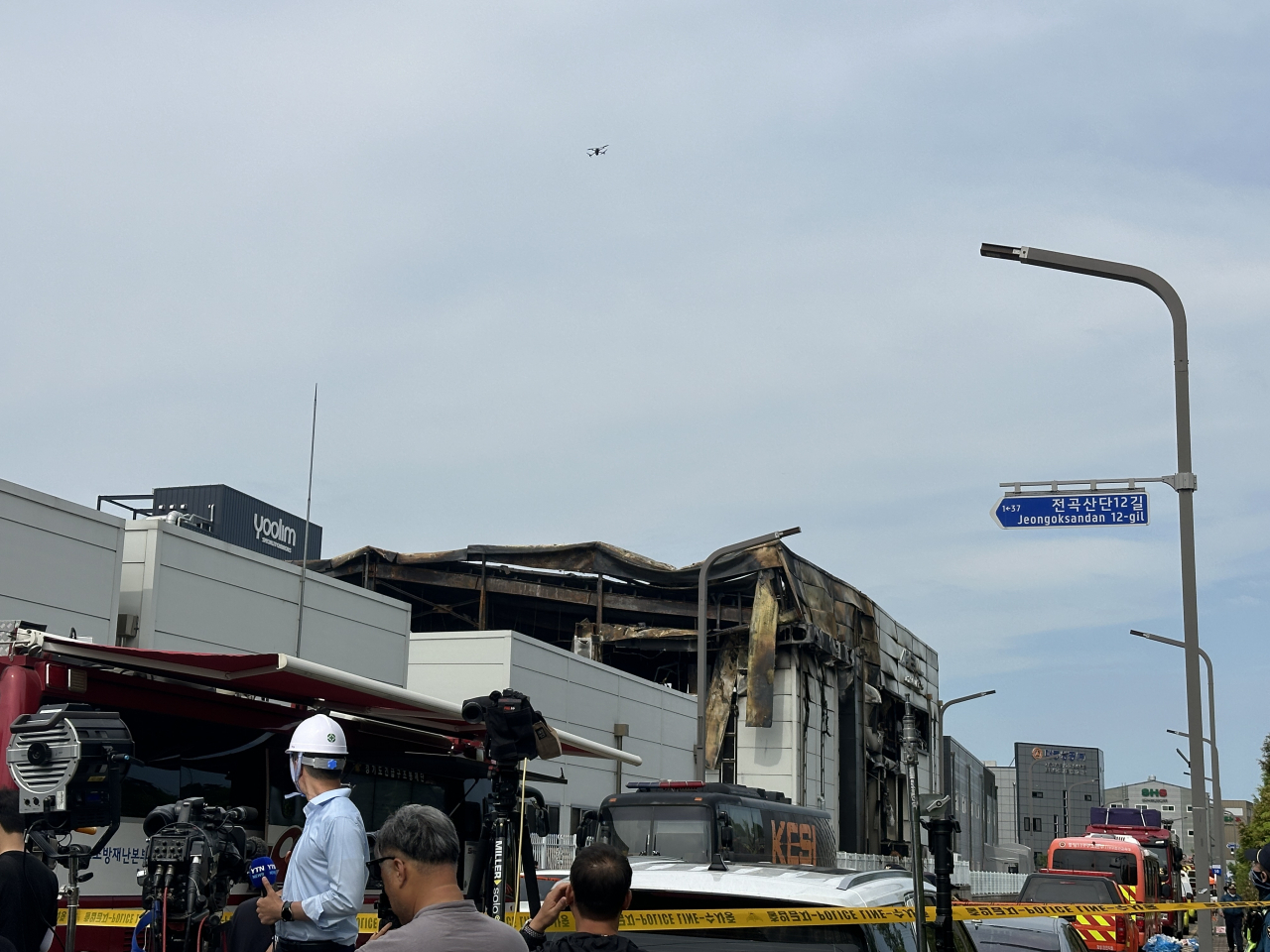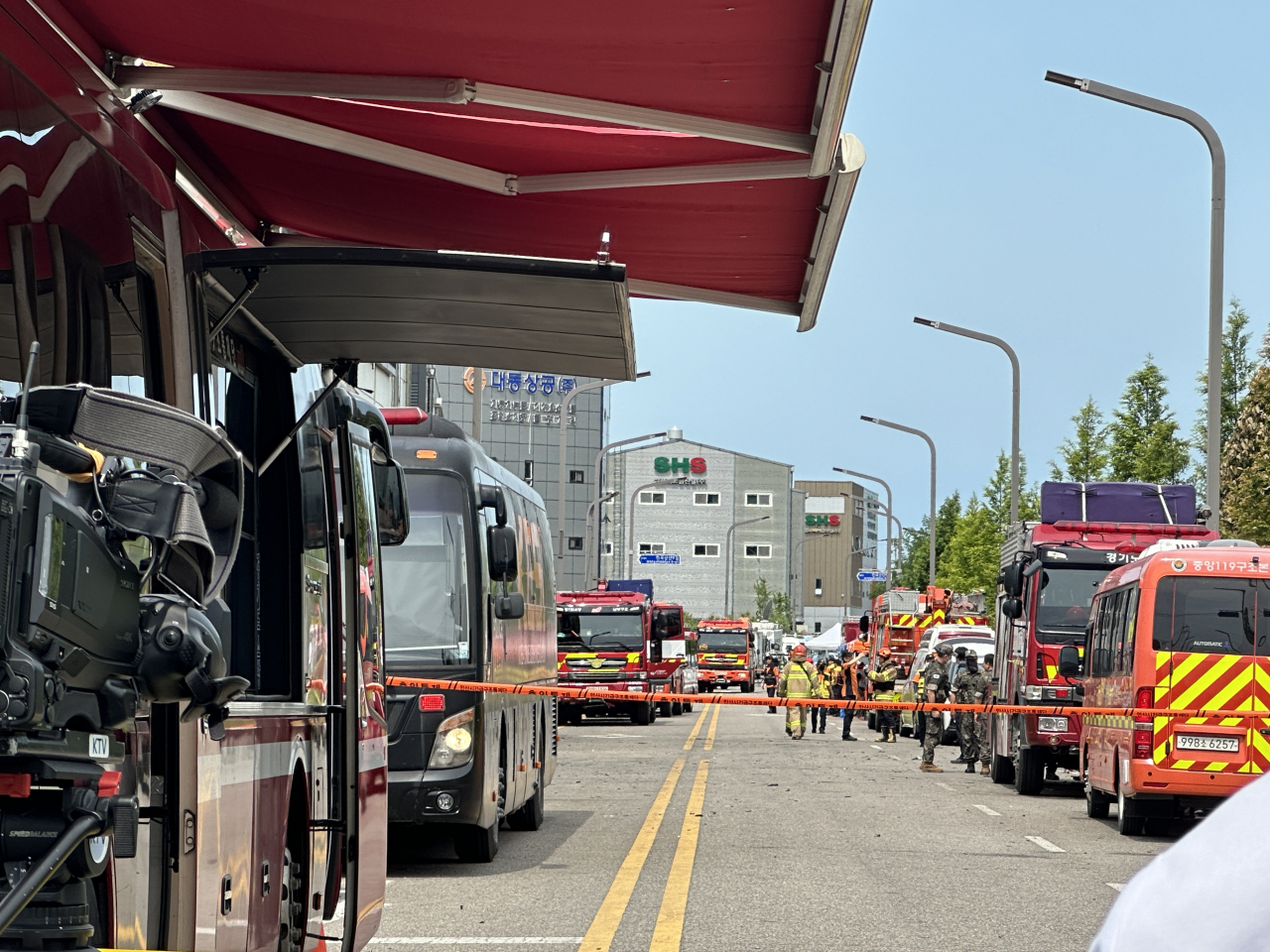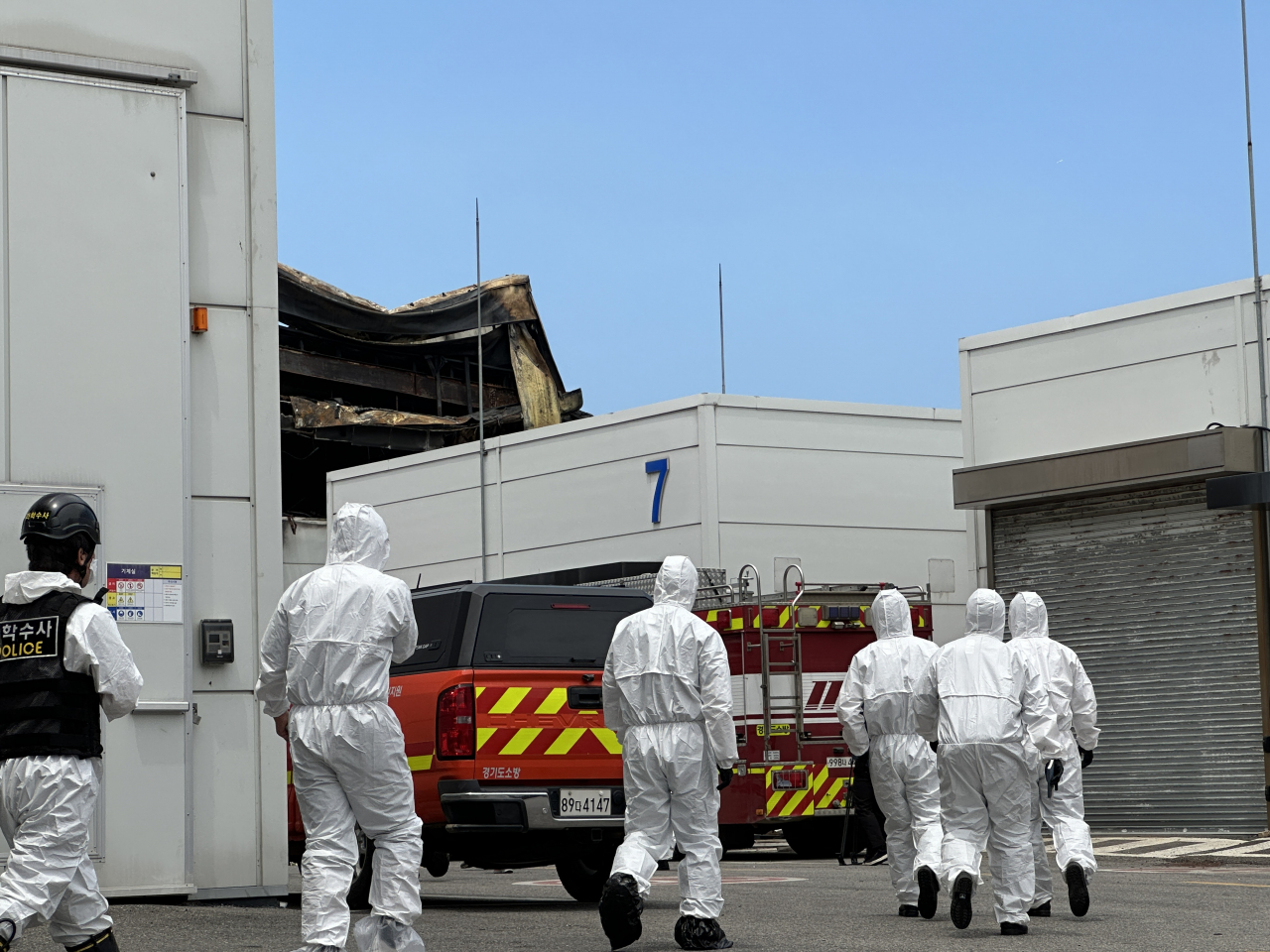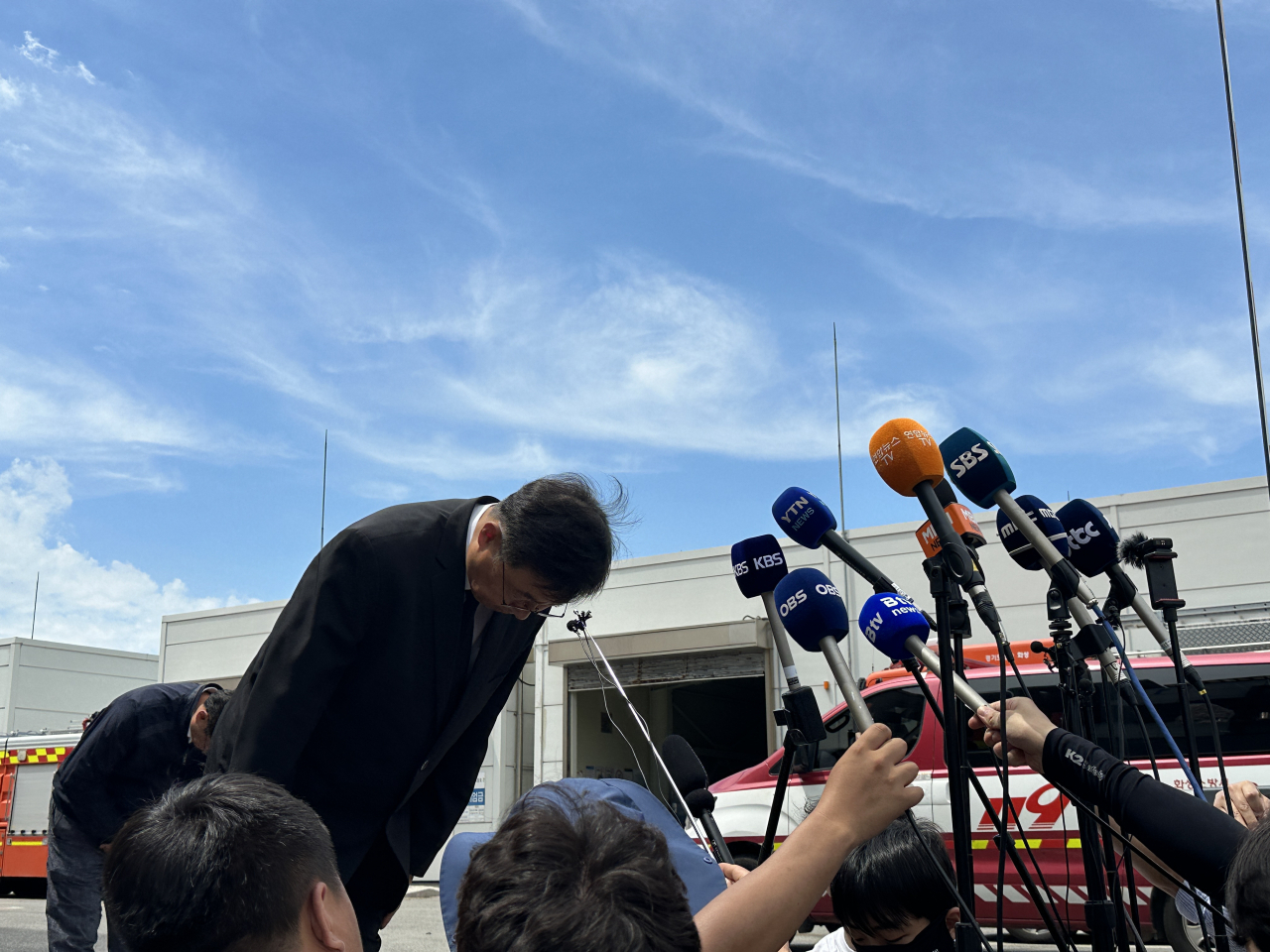 |
A part of the roof of Aricell Factory’s Building 3, a primary battery manufacturing factory in Hwaseong, Gyeonggi Province, is scorched in black and brown following a 22-hour long fire that broke out on Monday. (Lee Jung-joo/The Korea Herald) |
HWASEONG, Gyeonggi Province -- The deadly fire that engulfed Aricell, a lithium battery manufacturing factory in Hwaseong, Gyeonggi Province, was finally out by 8:48 a.m., Tuesday, 22 hours after the fire was first reported to authorities.
Although the fire was out, the smell of smoke still lingered in the air as fire officials, police officials and forensic services prepared their gear to conduct a joint forensic investigation. Tuesday’s joint forensic investigation began close to noon after an additional search for missing bodies commenced at 7 a.m., involving 40 officials from nine different organizations, including the police, the National Fire Agency, the National Forensic Service and the Ministry of Employment and Labor.
Around 10 a.m., three family members of one of the victims of Monday’s fire arrived at the site.
As soon as they saw the factory building -- completely scorched black and brown with nothing but its exposed structure left -- the family members sunk to the ground and broke down in tears.
“What will I do without her? It must have been so painful, so hot for her to be inside,” told one family member to the press on Tuesday. Though they didn’t receive a separate call from investigative officials nor from Aricell, they told the press that they had felt “a gut feeling to visit the site” after their 49-year-old niece, who works at the factory, couldn’t be reached on Monday.
“I don’t know anything about what happened to her. I just want answers, I just want to know what happened to my niece,” she said.
 |
Firetrucks are lined up along the Aricell Factory, a a primary battery manufacturing factory in Hwaseong, Gyeonggi Province, following a 22-hour long fire that broke out on Monday. (Lee Jung-joo/The Korea Herald) |
The fire at Aricell is recorded to have killed at least 23 people, with 18 of them being foreign nationals -- 17 were Chinese while one was Laotian -- though authorities initially gave a higher number. According to local media reports, the victims are mostly Chinese women in their 30s and 40s hired as day laborers to meet delivery needs.
While Aricell officials answered that they had safety manuals in place in Korean, English and Chinese around the factory, they failed to answer how other forms of training took place -- especially for day laborers who had just been dispatched to the site on Monday.
Regarding the loss of 17 Chinese nationals in the fire, Chinese Ambassador to South Korea Xing Haiming said through the embassy's social media account that he was "deeply saddened."
"I express my condolences to the victims and sincerely offer words of comfort to the bereaved family members and those injured."
 |
Officials conducting forensics operations make their way toward the Aricell Factory in Hwaseong, Gyeonggi Province, at noon on Tuesday. The first round of forensics operations in the factory lasted around 4 hours. (Lee Jung-joo/The Korea Herald) |
High foreign fatalities
Monday’s fire is South Korea's deadliest single accident for foreign workers, according to fire officials.
Aricell is one of the many factories currently in operation at Jeongok Industrial Complex in Hwaseong. As of 2023, 287 factories were in operation in total at the complex, where most of its labor force consists of foreign day laborers dispatched on a daily basis by contract labor offices.
According to an Aricell official, around 50 to 60 migrant workers were stationed at the factories run by Aricell on Monday, though the exact number who were working on site where the fire occurred is still unknown.
"We express our deepest regrets to the victims of the fire and to the bereaved families," said Aricell CEO Park Soon-kwan. "While Aricell recognizes that there is nothing the company can do to replace the grief of the bereaved families, we will take it as a great responsibility to support them and their loved ones in any way we can."
 |
Park Soon-kwan, CEO of Aricell, bows before offering condolences to the workers who were killed and apologizing to those affected during a press briefing on Tuesday. (Lee Jung-joo/The Korea Herald) |
Though factories like Aricell heavily depend on foreign workers to keep its business going, whether migrant workers are offered enough safety gear or proper safety trainings has always been doubted.
Lee Han-suk, director of the Migration & Human Rights Institute, told The Korea Herald that while the death of migrant workers is shocking, it is “not much of a surprise.”
“There are a lot more people dying and being injured that often don’t get the spotlight,” said Lee. “Sometimes they are denied of safety gear, and often times they have trouble understanding what’s taught during the training programs because they aren’t good at Korean. While migrant workers are essential to get these factories running, they are often ignored or shunned away.”
The fire at Aricell could have escalated its scale of damage due to the absence of clear communication and training systems from officials at the factory to those foreign irregular workers, according to local reports quoting experts.
While there were two exits available for the workers to escape from the fire -- with one being in close distance to the victims, fire officials on site told the press that it was likely that the victims did not know of the exit’s existence as the exit was covered with boxes containing packaged lithium batteries.
Experts deduced that Monday's fire was a man-made disaster, as it could have been prevented with proper measures in place.
"Korea is too preoccupied with meeting demands by filling in more labor," said professor Lee Byoung-hoon from Chung-Ang University's Department of Sociology. "If Korea wishes to continuously rely on foreign labor in the future, instead of just focusing on meeting the demand, we need to thoroughly implement inspection where the migrant workers are employed and make sure enough guidance is taking place."
Currently, in Korea, there is an increasing number of foreign nationals coming to work on temporary work visas. According to the Ministry of Justice, some 523,000 foreign nationals visited Korea on temporary work visas in 2023, a 16.3 percent increase compared to numbers from 2022. Out of these numbers, more than 100,000 were from China.
Due to low birth rates, the country has also become heavily dependent on migrant workers to fill blue-collar jobs that have been disregarded by Koreans. Therefore, in most factories, it has become more common to see migrant workers rather than Koreans.







![[Today’s K-pop] Blackpink’s Jennie, Lisa invited to Coachella as solo acts](http://res.heraldm.com/phpwas/restmb_idxmake.php?idx=644&simg=/content/image/2024/11/21/20241121050099_0.jpg)